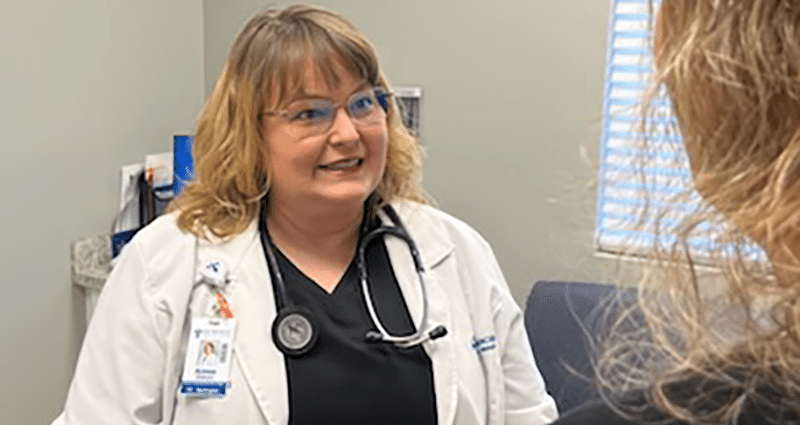Aimee Oldham, DNP, and her staff members were two minutes away from closing their medical clinic for the day when an elderly woman suddenly came through the door. Initially, they told her that they wouldn’t be able to treat her, but after seeing her distress, the team decided to stay late.
The woman was experiencing chest pains and was worried she was having a heart attack. Oldham, a longtime nurse practitioner at St. Francis, began performing cardiac tests, which revealed the woman’s heart was in good condition.
“Once I started talking to her and telling her that her cardiac status was good, we determined that it was really a panic attack,” Oldham said. “We let her talk and tell us her story. She had been to two urgent care centers before coming to us, but they both had long waits. It was at the height of COVID, so she was concerned about being around a lot of people or going to an emergency room. She really needed someone to listen to her and be present for her.”
Although it was after office hours, Oldham said she and other staff members at St. Francis were happy to give the woman peace of mind about her health.
“The minute she came in the door, she was the most important person in the building,” Oldham said. “She needed us so much that day. After we addressed her anxiety and made sure she was taken care of, she left in tears of joy. That was really rewarding.”
For Oldham, caring for patients is much more than simply a job. As an employee of a Catholic organization and a person with deep faith, each day is an opportunity for Oldham to serve as the hands and feet of Jesus.
“It’s important to me to live out my faith every day,” she said. “For me, that means caring for the whole person and their family as well. I see a couple regularly who have dementia. Their son and daughter-in-law bring them, and being able to reassure the family, hear their concerns and walk them through this process bit by bit has been so important. It’s not only about caring for specific health needs or conditions. It’s about taking care of the whole person, their families and all of their concerns.”
To do that, Oldham focuses on making sure patients and family members know she is listening to them during each visit. Whenever possible, she sets her computer aside when a patient is in the room. She makes eye contact, something that she said has become even more important with people wearing facial masks. If she has to type information, she reads it back to the person to confirm its accuracy and reassure people that she is listening to them without distraction.
Oldham also encourages her patients to take steps ahead of time to make sure their visits with her are successful. She often urges them to make a list of concerns they want to discuss, medications they are taking and any new symptoms.
“I also want them to have realistic goals for a visit,” she said. “We can’t always address every single issue at one time, so I often tell patients to identify the most important concerns and then come back for a short follow-up to address other issues. I think people understand that we may need to see them more often. We want to take good care of them, and sometimes that may mean more than one visit.”
Oldham said she also encourages patients to establish achievable goals for themselves if they want to improve their health. While it can be easy for clinicians to tell patients to exercise regularly and follow a healthy diet, Oldham said they should also be mindful of a person’s individual situation and obligations.
“I think it’s important to give people goals that they can accomplish and that make them feel like they have some control over their lives and their health,” she said. “Most people want to take care of their health, so it makes a difference when you take time to hear their concerns and why they might be resistant to change. Just taking that extra time with a patient can make a big difference in their health.”




